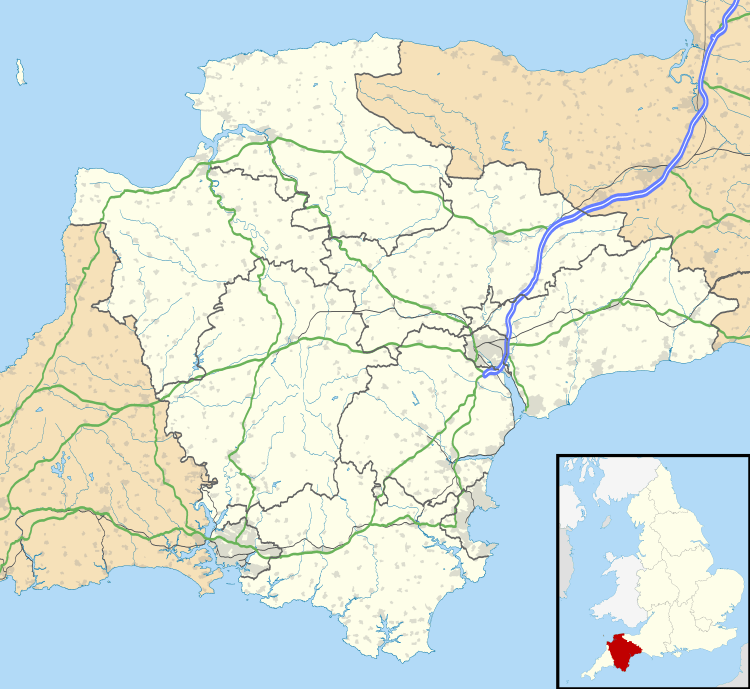Lifton, Devon
| Lifton | |
.jpg) Arundell Arms, Lifton |
|
 Lifton |
|
| Population | 1,180 [1] |
|---|---|
| OS grid reference | SX386851 |
| District | West Devon |
| Shire county | Devon |
| Region | South West |
| Country | England |
| Sovereign state | United Kingdom |
| Post town | LIFTON |
| Postcode district | PL16 |
| Dialling code | 01566 |
| Police | Devon and Cornwall |
| Fire | Devon and Somerset |
| Ambulance | South Western |
| EU Parliament | South West England |
| UK Parliament | Torridge and West Devon |
Coordinates: 50°38′35″N 4°16′56″W / 50.6431°N 4.2821°W
Lifton is a village and civil parish in Devon, South West England near the confluence of the rivers Wolf and Lyd, 1¼ miles south of the A30 trunk road and very near the border between Devon and Cornwall. The village is part of the electoral ward of Thrushel. The population of the surrounding Thrushel ward (which includes the village of Thrushelton to the east of Lifton) at the 2011 census was 1680.[2]
History
The village was one of the first in the west of Devon to be founded by the Saxons, and was of strategic importance because of its location on a major route close to the border with Cornwall. It was first recorded as Liwtune in the will of King Alfred in the late 9th century.[3] At a meeting of the Witan in Lifton on 12 November 931 King Æthelstan granted land to his thegn Wulfgar, and the charter was witnessed by King Hywel Dda of Deheubarth and King Idwal Foel of Gwynedd.[4]
Lifton became the centre of an administrative hundred, and was a royal manor, passing into private hands when sold by Queen Elizabeth I to local landowner William Harris of Hayne in the late 16th century. Since they had moved here from Kenegie in Cornwall their armorial bearings include a motto in Cornish, which is "Car Dew tres pub tra" ("Love God above everything").[5] An inn at Portgate, the Harris Arms, is named after the family.
There has been a church in Lifton since Norman times, although little of the existing St Mary's Church is earlier than the 15th century.[3] In 1755 the manor was inherited by the Arundell family.[6] The Arundell Arms is a hotel, formerly a coaching inn known as the "White Horse", which is known today for fishing.
Agriculture and mining have supported the economy in the past. The dairy company, Ambrosia, has been based here since 1917. Started as a milk factory using supplies from dairy farms in the area, it produced dried milk during the Second World War. The site has been enlarged considerably and the firm is now an important local employer.[6]
The village was bypassed by the A30 in 1993,[6] and today, unusually for such a small place, Lifton is a post town and has several youth football teams.
Lifton Park
A country house called Lifton Park was built by William Arundel in 1805 and was the centre of the Lifton estate.[7] Frederick Stockdale said of the house "very delightfully situated and commands an interesting prospect of the town of Launceston with its ancient castle, indeed no expense seems to have been spared to render the surrounding plantations containing about 8,000 acres."[8] During the Second World War, a boys' preparatory school called Moffatt's was evacuated to the house from Hertfordshire,[9] and shortly after the war the house was severely damaged by fire. The west wing has since been restored, but most of the former house still stands in ruins. Part of the park is an arboretum. The two entrances to the park still have lodges dating from the Victorian era.[7]
References and notes
- ↑ Lifton is made up of three output areas in the Thrushel ward http://www.ukcensusdata.com/thrushel-e05003658#sthash.QZN5NqJa.dpbs
- ↑ "Thrushel ward 2011". Retrieved 17 February 2015.
- 1 2 History of Lifton website
- ↑ Foot, Sarah (2011). Æthelstan: The First King of England. Yale University Press. p. 85. ISBN 978-0-300-12535-1.
- ↑ Quoted from the Cornish medieval play of the Passion, translated by Charles Henderson in: Henderson, Charles (1935) "Cornish inns", in: Essays in Cornish History; ed. by A. L. Rowse and M. I. Henderson. London: Oxford U. P.; pp. 168-71
- 1 2 3 Lifton Village Trail
- 1 2 Lifton Park at parksandgardens.org, accessed 4 October 2016
- ↑ Frederick Stockdale, MS papers for proposed history of Devon, c. 1826-1855, at Devon and Exeter Institution Library
- ↑ John Neale, Discovering the River Tamar, p. 65
External links
| Wikimedia Commons has media related to Lifton, Devon. |